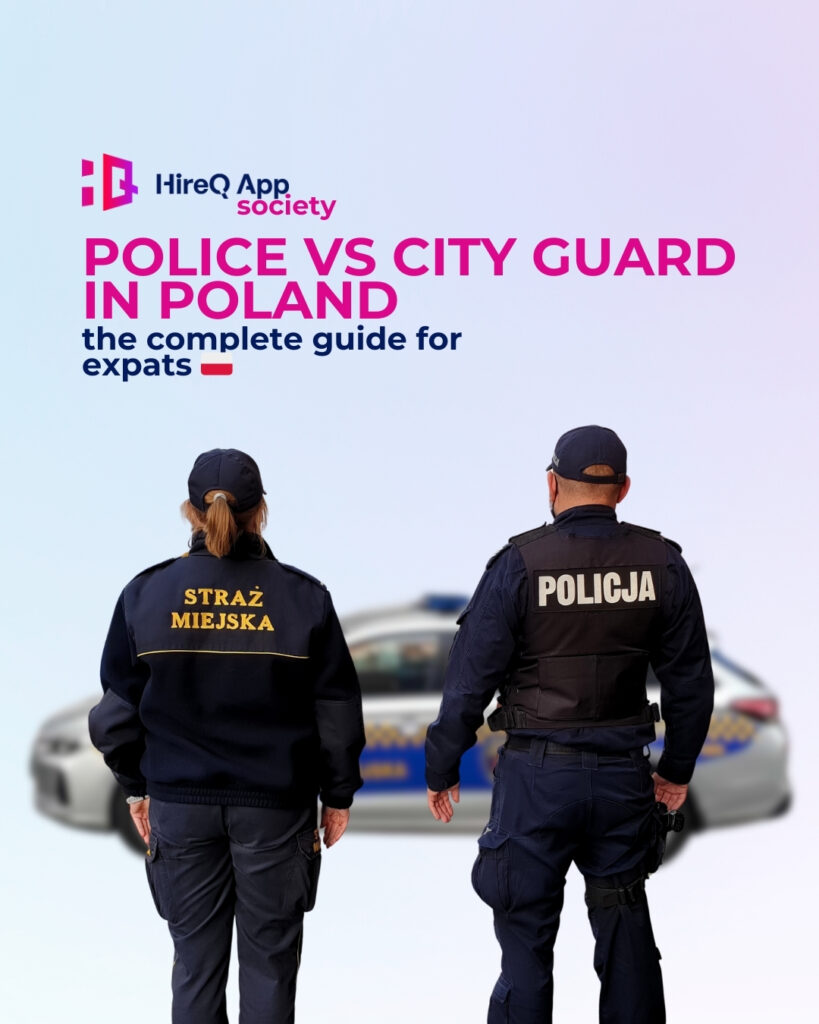
Moving to a new country means learning a lot — including who to call when something goes wrong.
In Poland, people often say “call the police,” but there’s another public safety service you’ll meet regularly: the City Guard (Straż Miejska).
They may look similar, but their roles, powers, and responsibilities are very different.
This clear guide explains how both services work — so you’ll know who to contact, what to expect, and how to avoid trouble.
👮♂️ Who Does What? Quick Definitions
Policja (Police) — Poland’s national law enforcement agency.
It’s a state-level, armed service with broad powers: crime prevention, investigation, public safety, traffic enforcement, and coordination with international forces.
Straż Miejska / Straż Gminna (City or Municipal Guard) — a local service created by city councils.
They handle public order inside municipalities, enforce local rules, and support the police when needed.
⚖️ Core Duties and Powers
What the Police can do:
Investigate crimes, collect evidence, and arrest suspects.
Protect life, health, and property.
Keep order during demonstrations or riots.
Manage traffic and road safety.
Issue fines and conduct searches under the law.
Handle serious offences and emergencies.
📞 Call Police for: violence, theft, serious accidents, criminal threats.
Numbers: 112 (EU-wide) or 997 (direct Polish Police).
What the City Guard can do:
Patrol public areas and prevent minor offences.
Enforce local laws (illegal parking, littering, noise, public drinking).
Issue local fines or warnings (wezwanie).
Help manage traffic and local events.
Secure festivals, protect municipal property, assist residents.
Check IDs only when public safety is at risk.
📞 Call City Guard (986) for: parking violations, noise, illegal burning, or public disturbance.
🔍 Main Differences You Should Remember
| Feature | Police (Policja) | City Guard (Straż Miejska) |
|---|---|---|
| Jurisdiction | Nationwide | Local (city/municipality) |
| Authority | Investigative & criminal powers | Administrative & preventive |
| Reports to | National government | Local mayor / council |
| Handles | Crimes, threats, accidents | Parking, noise, litter, minor offences |
💡 In everyday life:
You’ll mostly meet City Guard for local order issues.
For serious matters, always call Police.
🤝 Cooperation Between Police & City Guard
The two services work together regularly:
Joint patrols during events
Sharing info about local threats
Training and emergency coordination
Temporary cooperation during large crises (floods, disasters)
This teamwork ensures both safety and efficiency.
🚨 Real-Life Examples — Who to Call?
| Situation | Who to Call | Number |
|---|---|---|
| Theft or violent incident | Police | 112 / 997 |
| Car blocking driveway | City Guard | 986 |
| Noise at night | City Guard (or Police if violent) | 986 / 112 |
| Fire, explosion, serious crash | Police / Fire Brigade | 112 |
| Someone unconscious | Ambulance via 112 |
🚫 Common Myths & Mistakes
❌ “City Guard tickets don’t matter” — False. They are legal documents.
❌ “Police and City Guard are the same” — False. Each has a defined role.
❌ “You can ignore a wezwanie” — False. Always respond or clarify the notice.
📍 How to Find Contacts
Local Police: search “Komisariat Policji [your city]” on Google.
City Guard: search “Straż Miejska [city name]” or call 986.
National police website offers reporting tools for missing persons or crimes.
✅ Final Checklist
✔️ Emergency? Call 112
✔️ Police — for crimes, danger, investigations
✔️ City Guard — for parking, noise, litter, local order
✔️ Don’t ignore official summonses (wezwanie)
✔️ Stay calm — both services cooperate for your safety
Knowing who to call can save you time, money, and stress.
Save this post or share it with someone new in Poland — it might help them too. 🇵🇱
Share if you found this post useful!


